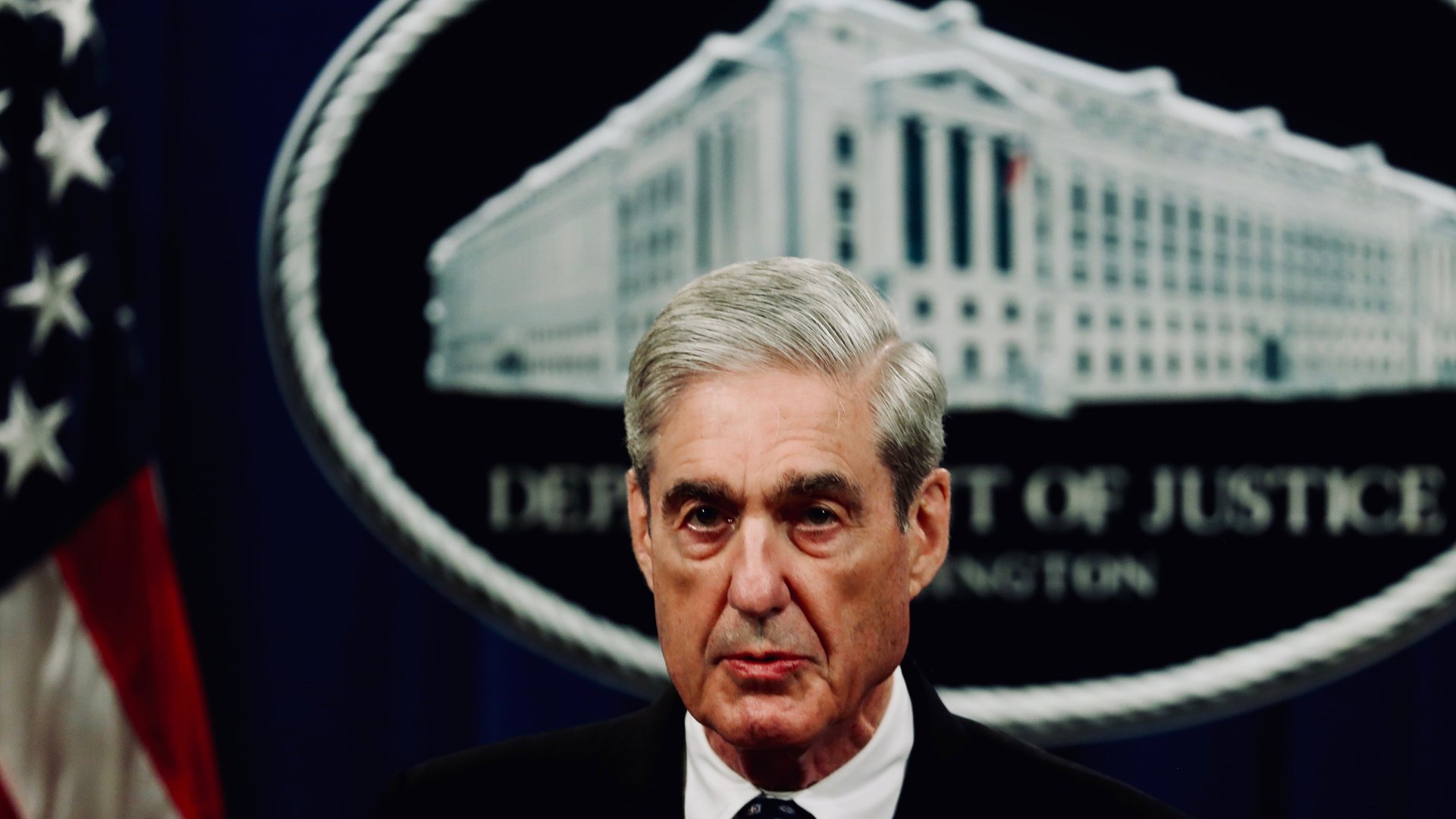This is the one thing everyone hopes Mueller can clarify
On July 24, former special counsel Robert Mueller will testify before the House Judiciary Committee and the House Intelligence Committee about his investigation into Russian meddling in the 2016 US presidential elections and president Donald Trump’s efforts to thwart that quest for truth.


On July 24, former special counsel Robert Mueller will testify before the House Judiciary Committee and the House Intelligence Committee about his investigation into Russian meddling in the 2016 US presidential elections and president Donald Trump’s efforts to thwart that quest for truth.
Much of the testimony will be public and many are hoping to know, once and for all, whether the president committed a crime. Did he obstruct justice?
“All members—Democrats and Republicans—of both committees will have a meaningful opportunity to question the Special Counsel in public, and the American people will finally have an opportunity to hear directly from Mr. Mueller about what his investigation uncovered,” committee chiefs Jerrold Nadler of New York and Adam Schiff of California wrote in a joint July 12 statement.
But we probably already know what he’ll say.
Mueller detailed his findings in a lengthy report, released to the public in April. The following month, in a press conference announcing his resignation as special counsel, he explained:
Any testimony from this office would not go beyond our report. It contains our findings and analysis, and the reasons for the decisions we made. We chose those words carefully, and the work speaks for itself. The report is my testimony. I would not provide information beyond that which is already public in any appearance before Congress.
The information Mueller already provided shows that there were “multiple, systematic efforts to interfere in our election,” but that there was “insufficient evidence to charge a broader conspiracy” between the Trump campaign and Russian operatives.
As for obstruction of justice, there was insufficient evidence to clear the president of criminal wrongdoing. “As set forth in our report, after that investigation, if we had confidence that the President clearly did not commit a crime, we would have said that,” Mueller stated.
So, Mueller’s report didn’t exonerate Trump. But it also didn’t say the president committed a crime.
This conclusion has confused people, which is why lawmakers want Mueller to testify. They want straight answers and are hoping the investigator will provide them this time, essentially telling them whether or not to impeach the president.
Chances are good, however, that Mueller will stick to his script, which doesn’t come with instructions, just not-so-subtle hints that thus far have been lost on many people.
As Mueller has previously explained, Department of Justice policy prohibits charging a president with a federal crime while he is in office. Mueller’s office was part of the DOJ and so was bound by that policy. “Charging the President with a crime was therefore not an option we could consider,” Mueller stated.
Still, he noted that the DOJ rule “says that the Constitution requires a process other than the criminal justice system to formally accuse a sitting President of wrongdoing.”
That’s the hint. The other process is impeachment.
But it’s not Mueller’s place, he seems to be saying, to tell lawmakers what to do. His job was to investigate and report. Regarding crimes on the president’s part, he couldn’t file charges for technical reasons—that DOJ policy. Yet he couldn’t clear Trump either based on the substance of his investigation, which outlines numerous occasions where Trump lied and tried to impede the inquiry or influence its outcome. Mueller gave us that information and that’s likely all we’ll get from the reticent investigator.
Why won’t Mueller accuse Trump?
Mueller’s refusal to elaborate will seem shady perhaps. Why not just come out and say whether or not the president broke the law? Well, as he’s already said, since he couldn’t charge the president based on the DOJ rule, Mueller didn’t even try to reach a conclusion on the issue of criminality.
That doesn’t mean there was no crime, however. In fact, as Mimi Rocah, a former assistant US attorney and NBC/MSNBC legal analyst recently put it, “[T]he report contains such an overwhelming amount of incriminating information that it is easy to lose sight of how shocking the conduct is until it is examined in isolation.”
For all of Mueller’s warnings that he “will not comment on any other conclusions or hypotheticals about the President,” he’s also consistently emphasized his inability to exonerate Trump. And DOJ policy didn’t constrain him in that regard. So, if he could have cleared Trump, he would have. But the evidence didn’t allow it. Meanwhile, all that policy permitted Mueller to do with the damning evidence was write a report outlining the president’s lies and attempted manipulations of the investigation.
A month to mull Mueller’s testimony
After Mueller testifies this week, lawmakers will still have to decide what, if anything, to do with the investigation that he handed them. However, the hearings are scheduled just one day before they go on a monthlong summer break, which means that even if Mueller suddenly speaks crystal clearly about Trump’s criminality, instead of couching his conclusions in lawyerly caveats—an unlikely prospect—the timing will be just right to distract Americans and their representatives from the president’s conduct again.
From Mueller’s perspective, that may not be quite as problematic as ignoring the rest of his findings. As he stated in May, “I will close by reiterating the central allegation of our indictments—that there were multiple, systematic efforts to interfere in our election. That allegation deserves the attention of every American.”